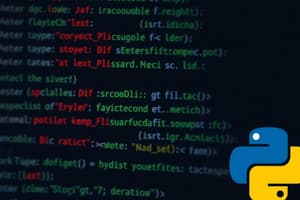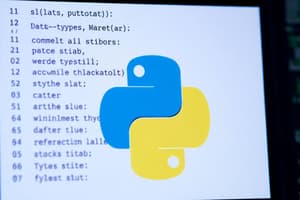Podcast
Questions and Answers
What type of exception is raised when trying to convert a string that does not represent a valid number to a float or an integer?
What type of exception is raised when trying to convert a string that does not represent a valid number to a float or an integer?
- SyntaxError
- OverflowError
- ValueError (correct)
- TypeError
Which Python function is used to check the type of an object?
Which Python function is used to check the type of an object?
- type() (correct)
- checkType()
- typeOf()
- objectType()
What does the 'math.ceil(x)' function return?
What does the 'math.ceil(x)' function return?
- The smallest integer less than x
- The smallest integer greater than x
- The smallest integer less than or equal to x
- The smallest integer greater than or equal to x (correct)
Which math function is used to return the largest integer less than or equal to a given number?
Which math function is used to return the largest integer less than or equal to a given number?
What does the 'math.fmod(x,y)' function return?
What does the 'math.fmod(x,y)' function return?
In which scenario would a 'ValueError' exception be raised based on the text?
In which scenario would a 'ValueError' exception be raised based on the text?
What is used to specify the value that a function should return?
What is used to specify the value that a function should return?
In the 'greet' function call, what values are passed as arguments for the 'name' and 'greeting' parameters?
In the 'greet' function call, what values are passed as arguments for the 'name' and 'greeting' parameters?
What is stored in the 'result' variable in the 'add' function example?
What is stored in the 'result' variable in the 'add' function example?
What happens if a function does not contain a 'return' statement?
What happens if a function does not contain a 'return' statement?
What does the 'max_of_two' function return?
What does the 'max_of_two' function return?
When does a function terminate?
When does a function terminate?
What is the purpose of a base case in recursive functions?
What is the purpose of a base case in recursive functions?
In the context of recursive functions, what happens when a base case is missing?
In the context of recursive functions, what happens when a base case is missing?
Why is caution advised when using recursion to solve problems?
Why is caution advised when using recursion to solve problems?
What would happen if a recursive function does not have a termination condition?
What would happen if a recursive function does not have a termination condition?
How does recursion contribute to solving problems when used properly?
How does recursion contribute to solving problems when used properly?
What happens to the value of the global variable 'name' when the 'print_name' function is called?
What happens to the value of the global variable 'name' when the 'print_name' function is called?
How do global variables differ from local variables in Python?
How do global variables differ from local variables in Python?
What purpose do local variables serve in Python functions?
What purpose do local variables serve in Python functions?
Why is it important to be mindful of variable scope when writing functions in Python?
Why is it important to be mindful of variable scope when writing functions in Python?
How can using global variables appropriately enhance code modularity in Python?
How can using global variables appropriately enhance code modularity in Python?
What are modules in Python primarily used for?
What are modules in Python primarily used for?
What happens when calling the 'add' function with arguments '3' and '5'?
What happens when calling the 'add' function with arguments '3' and '5'?
What does an optional parameter in a function allow?
What does an optional parameter in a function allow?
In the function call to 'greet' with argument 'John', which parameter uses the default value?
In the function call to 'greet' with argument 'John', which parameter uses the default value?
What is a correct statement about passing arguments to functions?
What is a correct statement about passing arguments to functions?
What occurs if a caller provides a value for an optional parameter in a function?
What occurs if a caller provides a value for an optional parameter in a function?
What happens if no argument is passed for an optional parameter in a function call?
What happens if no argument is passed for an optional parameter in a function call?
Flashcards are hidden until you start studying
Study Notes
Arguments and Parameters
- In a function call, arguments are passed to the function and assigned to parameters.
- Optional parameters can be defined in a function definition with default values.
- If no value is provided for an optional parameter, the default value is used.
Global and Local Variables
- A global variable is defined outside of a function and can be accessed from within the function.
- A local variable is defined within a function and is only accessible within that function.
- Local variables can be used to temporarily store data specific to a particular function call.
- Global variables can be used to store data that needs to be shared across multiple function calls.
Modules
- A module is a file containing definitions and statements.
- Modules are important aspects of the Python programming language.
Recursion
- Recursion is a technique where a function calls itself.
- A recursive function must have a base case, which is the point where the function stops calling itself.
- Without a base case, a recursive function can lead to a maximum recursion depth exceeded error.
Type Conversion Functions
- The
type()function is used to check the type of an object. - Type conversion functions, such as
str(),float(), andint(), can be used to convert variables to different data types. - Trying to convert a string that does not represent a valid number to a float or an integer will raise a
ValueErrorexception.
Math Functions/Methods
- The
mathmodule in Python provides several mathematical functions and constants. - Examples of math functions include
math.ceil(x),math.floor(x), andmath.fmod(x, y).
Return Values
- A function can return a value using the
returnstatement. - If a function does not contain a
returnstatement, it returnsNone. - The
returnstatement can be used in conditional statements to return different values based on the conditions.
Studying That Suits You
Use AI to generate personalized quizzes and flashcards to suit your learning preferences.




